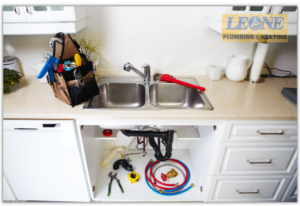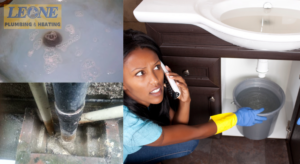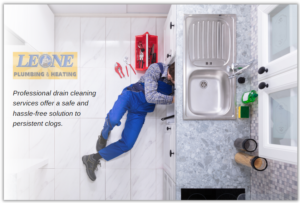A Guide to Effective Residential Drain Cleaning
 Having a clean and functional drainage system is essential for a smooth-running household. However, over time, debris, grease, hair, and other materials can accumulate in your pipes, leading to clogs and potential damage. That is why regular residential drain cleaning is essential for a clean and well-maintained drainage system. If you are tired of dealing with stubborn clogs and plumbing issues in your residential drains, this article is for you! Don’t let clogged drains disrupt your daily routine. Follow our guide and experience the relief of a clog-free living space.
Having a clean and functional drainage system is essential for a smooth-running household. However, over time, debris, grease, hair, and other materials can accumulate in your pipes, leading to clogs and potential damage. That is why regular residential drain cleaning is essential for a clean and well-maintained drainage system. If you are tired of dealing with stubborn clogs and plumbing issues in your residential drains, this article is for you! Don’t let clogged drains disrupt your daily routine. Follow our guide and experience the relief of a clog-free living space.
The Importance of Regular Residential Drain Cleaning
A clean and well-maintained drainage system is crucial for the overall functionality of your home. Regular drain cleaning not only prevents clogs and plumbing issues but also ensures the longevity of your pipes. Neglecting drain cleaning can lead to costly repairs and even potential health hazards.
One of the main benefits of regular residential drain cleaning is the prevention of clogs. Over time, debris such as food particles, soap scum, and hair can accumulate in your pipes, causing blockages. These clogs can lead to slow drains, unpleasant odors, and even water backups. By cleaning your drains regularly, you can remove these build-ups and prevent clogs from occurring.
How To Detect A Clogged Drain?
 Identifying a clogged drain early on is crucial for preventing further damage and resolving the issue promptly. If you notice any of these signs, it’s important to address the issue promptly to prevent further damage.
Identifying a clogged drain early on is crucial for preventing further damage and resolving the issue promptly. If you notice any of these signs, it’s important to address the issue promptly to prevent further damage.
1. Slow draining:
If water takes longer than usual to drain from your sink, shower, or bathtub, it may be a sign of a clogged drain. Slow draining is often caused by a build-up of debris that restricts the flow of water.
2. Gurgling sounds:
If you hear gurgling sounds coming from your drains when you flush the toilet or run water, it could indicate a clog. These sounds occur when air gets trapped in the pipes due to a blockage.
3. Foul odors:
Unpleasant odors emanating from your drains are a clear sign of a clogged drain. When debris accumulates in your pipes, it can start to decompose, resulting in foul smells.
4. Water backups:
If water starts to back up in your sink, shower, or toilet, it is a definite indication of a clogged drain. Water backups occur when a clog prevents water from flowing freely through the pipes.
5. Multiple clogged fixtures:
When several fixtures in your home, such as sinks and toilets, experience drainage issues simultaneously, it suggests a clog in the main sewer line. This requires immediate attention from a professional plumber.DIY Drain Cleaning Methods
When faced with a clogged drain, there are several DIY methods you can try before calling in a professional plumber. These methods are cost-effective, easy to implement, and can often resolve minor clogs. Here are some effective DIY residential drain cleaning methods:
1. Boiling water:
Boiling water is one of the simplest and most effective methods for clearing minor clogs. Carefully pour a pot of boiling water down the drain to dissolve grease and other debris. This method works well for clogs caused by soap scum or grease build-up.
2. Baking soda and vinegar:
This classic DIY drain cleaning method can help break down clogs and eliminate odors. Start by pouring half a cup of baking soda down the drain, followed by half a cup of vinegar. Cover the drain and let the mixture sit for about 30 minutes. Finally, flush the drain with hot water to clear the clog.
3. Plunger:
A plunger is a versatile tool that can be used to unclog various fixtures, such as sinks, toilets, and showers. Make sure there is enough water in the fixture to cover the suction cup of the plunger. Place the plunger over the drain and vigorously plunge up and down. Repeat this process several times until the clog is dislodged and the water drains freely.
4. Wire hanger:
If you can’t reach the clog with a plunger, a wire hanger can be a handy tool to retrieve it. Straighten the hanger and create a small hook at one end. Insert the hooked end into the drain and try to fish out the clog. Be gentle to avoid scratching or damaging the pipes.
5. Salt and baking soda:
This DIY solution is particularly effective for clearing clogs caused by grease and food particles. Mix equal parts salt and baking soda and pour the mixture down the drain. Let it sit for a few hours or overnight, then flush the drain with hot water. The salt and baking soda combination helps break down grease and eliminate odors.
Remember, these DIY methods are suitable for minor clogs. If you’re dealing with persistent or severe blockages, it’s best to seek professional help.
You Can Avoid Clogged Drains From Occurring!
Prevention is key when it comes to maintaining clean and functional drains. By adopting a few simple habits and implementing preventive measures, you can minimize the chances of experiencing drain clogs.
Using Drain Covers or Strainers
One of the easiest ways to prevent drain clogs is by using drain covers or strainers. These inexpensive accessories can catch hair, food particles, and other debris before they enter your drains. Regularly cleaning the covers or strainers will ensure they continue to function effectively.
Be Mindful Of What You Put Down Your Drains
Another preventive measure is to be mindful of what you put down your drains. Avoid pouring grease, oil, coffee grounds, and other substances that can solidify and cause clogs. Instead, dispose of these items in the trash or recycle them appropriately. Additionally, ensure that your family members are aware of what should and shouldn’t be flushed down the toilet.
Regularly Flush Drains With Hot Water
Regularly pouring boiling water down your drains can also help prevent clogs. Boiling water can dissolve grease and other sticky substances that may be clinging to the inside of your pipes. This simple technique, when done once a week, can go a long way in keeping your drains clear and free-flowing.
By following these preventive measures, you can significantly reduce the risk of clogged drains and maintain a healthy plumbing system.
The Role of Professional Drain Cleaning Services

While DIY methods and preventive measures can be effective for minor clogs, sometimes the expertise of a professional drain cleaning service is necessary. Professional plumbers have the knowledge, experience, and specialized tools to tackle even the most stubborn clogs and ensure a thorough cleaning of your drains.
Professional drain cleaning services offer several advantages over DIY methods. Firstly, they have access to high-pressure water jetting equipment, which can effectively clear even the toughest clogs and remove debris from your pipes. This method is particularly useful for removing tree roots or mineral build-up.
Secondly, professional drain cleaners use video inspection technology to identify the exact location and cause of a clog. This allows them to provide targeted solutions and prevent future issues. Video inspections also help detect any underlying problems within your plumbing system, such as damaged pipes or misaligned connections.
Lastly, professional drain cleaning services offer a safe and hassle-free solution to persistent clogs. They have the necessary protective gear and know-how to handle potentially hazardous substances, such as chemical drain cleaners or sewage backups. Hiring a professional ensures that the job is done safely and effectively, giving you peace of mind.